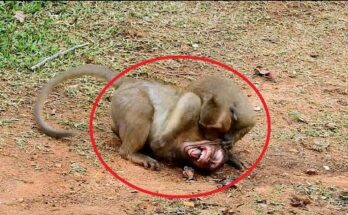The Male Monkey Challenged the Monkey King and Invaded Territory, the Consequences Were Very Serious
In the wild, the world of monkeys is not only playful and lively but also filled with struggles for survival, dominance, and power. Among primate communities, hierarchy plays a crucial role, especially when it comes to the position of the alpha male or the monkey king. This leader is not only responsible for protecting his group but also for maintaining order, ensuring access to food, and defending against outside threats. However, every reign is constantly challenged, as ambitious younger males often seek to overthrow the king and claim both his power and privileges.
In this dramatic encounter, a strong male monkey dared to challenge the reigning monkey king by invading his territory. The confrontation was not merely a quarrel but an open declaration of war. For the challenger, victory would mean gaining dominance, access to the females of the group, and control over food resources. For the king, defeat could result in the loss of everything he had fought for—his power, his family, and even his life.
The conflict began with tense stares and loud screams echoing through the trees. Both males puffed their chests, bared their teeth, and shook branches to intimidate one another. The atmosphere grew heavier as the troop gathered around, watching the drama unfold with anxious eyes. The females clutched their babies tightly, unsure of who would emerge victorious, while younger males kept their distance, avoiding getting caught in the brutal clash.
Suddenly, the fight erupted. The challenger lunged forward with a fierce display of aggression, and the monkey king responded with equal force. Their bodies clashed violently, fur flying, claws scratching, and teeth biting. The forest filled with the sounds of screams, growls, and the crashing of branches as the two males battled for dominance. Each attack was met with retaliation, neither willing to surrender.
As the fight dragged on, the seriousness of the situation became evident. Blood marked their fur, and exhaustion weighed heavily on their movements, but the challenger pressed harder, determined to overthrow the king. The monkey king, though older, fought with the strength of experience and the fury of a leader protecting his throne.
The consequences of such a battle were grave. If the king were to lose, not only would he be forced into exile, but his offspring could also be at risk. In many monkey societies, a victorious male may kill the babies of his rival to eliminate competition and ensure his bloodline takes precedence. The troop’s stability would be shaken, and fear would ripple through the group. On the other hand, if the king defended his throne, the challenger would face severe injuries, banishment, or even death.
In the end, such battles are reminders of the harsh reality of life in the animal kingdom. Power is never permanent, and every leader is vulnerable to challenge. The struggle between the challenger and the monkey king shows us that survival in the wild is not just about food and shelter—it is also about dominance, legacy, and the unending cycle of nature’s rule.


